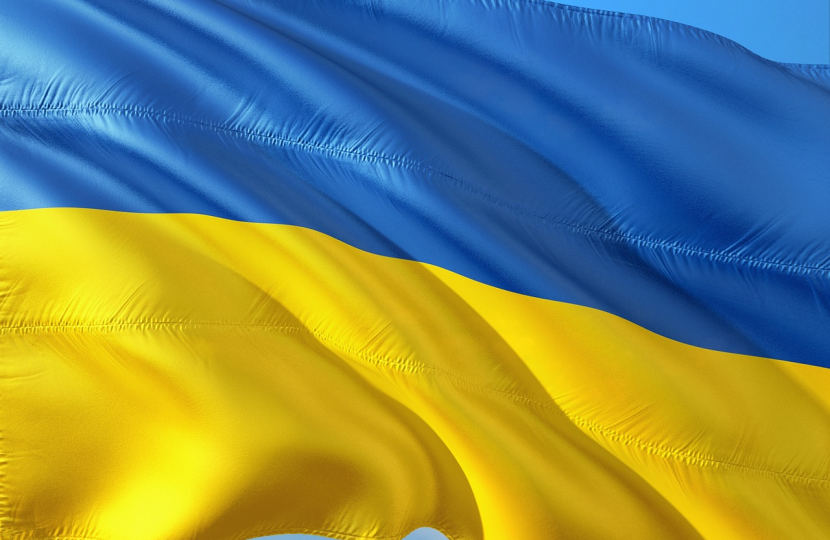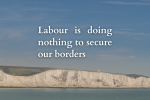
President Putin has unleashed a full-scale invasion of Ukraine by land, sea and air. This is a premeditated and wholly unprovoked attack on a sovereign democratic state. My thoughts are with the Ukrainian people and their President, whose defiance, courage and patriotism in the face of foreign aggression is inspiring.
The UK and allies have been clear all along that there would be a severe cost for any further Russian military incursion into Ukraine.
Military Aid:
The UK has, for a number of years now, worked to support Ukraine's security and defence. The UK has trained over 22,000 members of the Ukrainian army through Operation ORBITAL and, since 2019, assisted Ukraine to build up and sustain a naval capability. In the months prior to the invasion, the UK provided extra support in the form of 2000 anti-armour missiles, which the Ukrainians are now putting to good use.
In October 2020 the UK and Ukraine also signed a Memorandum of Intent that would focus on developing Ukraine’s naval capabilities through a new Naval Capabilities Enhancement Programme (NCEP).
With regards to NATO, the UK spends more in cash terms than any NATO member, other than the US, on defence. The UK is Europe’s largest contributor to NATO. We have deployed more troops to NATO’s Enhanced Forward Presence than any other Ally.
The British Army leads the NATO Battlegroup in Estonia and, because of this ongoing crisis, is doubling the number of UK personnel based there and sending additional equipment, including tanks and armoured fighting vehicles.
The UK also has troops stationed in Poland as part of NATO's enhanced Forward Presence there. Royal Marines from 45 Commando have also deployed to Poland to support the Polish Armed Forces with joint exercises, contingency planning, and capacity building in the face of Russia's invasion of Ukraine. This support is being offered on a bilateral basis and is not part of the UK’s offer to NATO.
Additional aircraft have also been posted to our base in Cyprus to patrol the skies with NATO Allies in Eastern Europe, and UK warships are conducting patrols in the Eastern Mediterranean Sea alongside NATO Allies from Canada, Italy, Spain and Turkey.
The UK has long called on others to increase their contributions to the Alliance, and it is very welcome that, for instance, Germany recently announced that it will henceforth spend 2 per cent of its GDP on defence.
Sanctions:
In lockstep with allies, the UK is:
- Freezing the assets of all Russian banks with immediate effect, including VTB, Russia’s largest bank. Co-ordinated with the US this is the single biggest financial sanction in history.
- Preventing Russian companies from borrowing on the UK markets, effectively ending the ability of those companies closest to Putin to raise finance in the UK. This is in addition to banning the Russian state itself from raising funds in the UK, as previously announced.
- Alongside the US, EU, Japan and Canada, cutting Russia’s Central Bank off from our markets.
- Strengthen our trade and export controls against Russia; banning the export of a range of high-end and critical technical equipment and components in sectors including electronics, telecommunications, and aerospace.
- Sanctioning President Putin and Russian Foreign Minister Sergey Lavrov.
- Sanctioning over 100 companies and oligarchs at the heart of Putin’s regime, including the vast majority of the Russian defence sector.
- Sanctioning members of the Russian Duma and Federation Council.
- Banning Russia's national airline (Aeroflot) from UK airspace, and indeed any aircraft which is registered in Russia or owned, chartered or operated by a person connected with Russia from UK airspace.
- Imposing new restrictions to cut off wealthy Russians’ access to UK banks.
- Excluding many of Russia's key banks from the SWIFT financial system (and pushing for a full ban).
- Imposing sanctions on Belarus for its complicity in Putin's invasion.
Humanitarian Aid:
More than 1,000 British troops have been made ready to support NATO and allies in the event of a humanitarian crisis. These troops are at readiness in the UK to support a humanitarian response in the region should it be needed.
The Prime Minister also announced that the UK will send an additional £40 million in humanitarian aid to Ukraine, bringing the total amount of UK aid pledged this year to £140 million. The UK is also guaranteeing up to $500 million of loans to Ukraine through Multilateral Development Banks.
Support for Refugees:
The new Ukrainian Family Scheme will enable British nationals and Ukrainians already settled in the UK to bring a wider group of family members to the country, extending eligibility to parents, grandparents, adult offspring and siblings. This generous offer broadens the original package beyond immediate family members which formed part of the first phase of the Government’s humanitarian response. Those joining family in the UK will be granted leave for an initial period of 12 months and will be able to work and access public funds.
Where family members of British nationals do not meet the usual eligibility criteria – but pass security checks – UK Visas and Immigration will give them permission to enter the UK outside the rules for 12 months and is prioritising all applications.
Furthermore, the Government is establishing a humanitarian sponsorship pathway, which will open up a route to the UK for Ukrainians who may not have family ties with the UK but who are able to match with individuals, charities, businesses, and community groups. Those who come under this scheme will also be granted leave for an initial period of 12 months and will be able to work and access public services.
The UK Visa Application Centre in Kyiv is now closed because of the security situation in the city. Family members of British Nationals resident in Ukraine who need a UK visa can still apply through the new, temporary location in Lviv staffed by remaining government officials, or through an Application Centre in a nearby country where there is surged capacity, including in Poland, Romania, Moldova, and Hungary.
On 12 February, the Home Office set up a dedicated helpline on 0300 3032785 for anyone who is intending to apply under the Family Migration route to assist with making an application. This is operating on a 24/7 basis.

